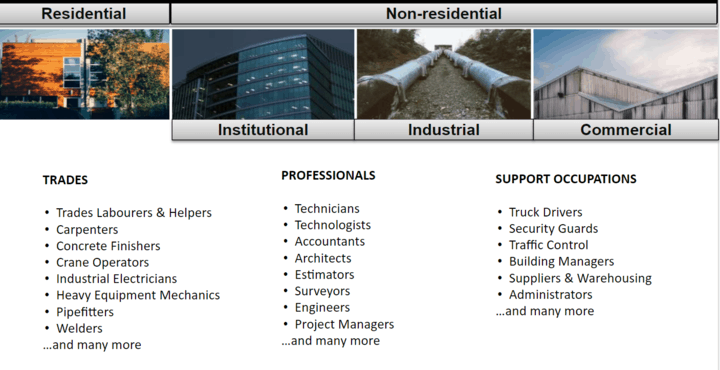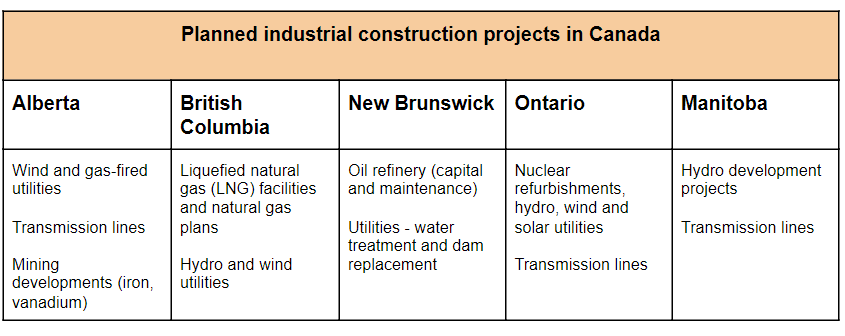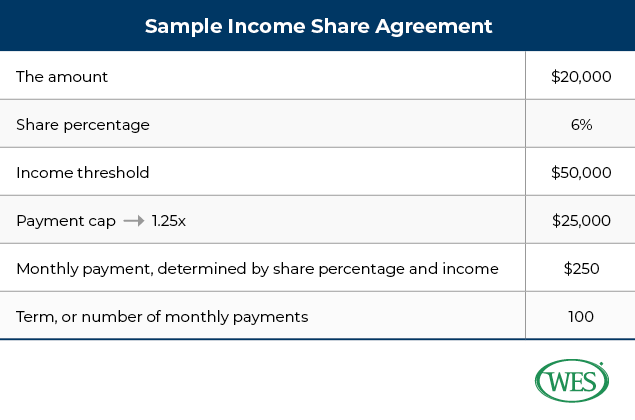by



Are you thinking about working in construction jobs in Canada? If so, Canada needs your skills and experience for many great skilled trades jobs!
Canada has a high demand for skilled tradespeople for many large-scale building and infrastructure projects. So to understand what’s happening in construction, we’ll look at four important things to know about the industry including:
- An overview of the industry
2. Construction credentials and certifications required in Canada
3. The job outlook for construction jobs
4. Labour market conditions for construction jobs in Canada: 2017 – 2026
The outlook for construction jobs is strong with many possibilities. And, the industry is growing so you can build a great career in skilled trades.
In fact, the industry is facing a labour shortage. And that’s because it’s expected that 21% of construction workers will retire over the next decade. As a result, the Canadian Construction Association (CCA) is working with the federal government to invest in programs to attract new Canadians. So, skilled trades are an excellent career opportunity for new Canadians.
To work in construction jobs in Canada, it’s important to understand what’s required before you arrive. When you know what’s required, you’ll be in a better position to land a construction job.
For example, if your trade is regulated in the province or territory where you plan to live, you will need to:
- Get a license or certificate
- Register with the provincial or territorial regulatory body to work in your trade-in Canada.
1. An overview of the construction industry in Canada
In Canada, the construction industry employs 1.4 million people, and it is one of the leading sources of employment in Canada. The industry has two primary sectors:
- Residential construction
2. Non-residential construction (institutional, industrial, commercial)

Residential construction sector
Work in the residential sector includes both new home building and home renovation. And, employers in residential construction are typical:
- New home builders and renovation contractors who hire tradespeople on staff
2. Trade contractors that specialize in a specific area such as plumbing contractors or heating, ventilation, and air-conditioning (HVAC) contractors.
There are many opportunities in residential construction across Canada. But, some regions more active than others. So, it’s important to research job demand at the national, provincial, and local levels.
Non-residential construction sector (Industrial, Institutional & commercial, Engineering)
Industrial construction
Within industrial construction, there are many large, resource-based construction projects on the rise all across the country.
While industrial projects are planned in all provinces and territories, here are some examples of projects taking place across Canada:

Institutional and commercial construction:
Institutional construction is an important type of building work. It refers to building structures that play a vital role in communities related to:
- Healthcare
- Public works
- Education
- Recreation
Construction workers in this sector can build anything from hospitals and elementary schools to athletic centers and universities.
Within commercial construction, some of the main activities include constructing:
- Office buildings
- Hotel and entertainment buildings (gyms, cinemas, and arenas)
- Retail stores and shopping centers
Mainly, general contractors or project managers are responsible for new constructions, additions, maintenance and repair of commercial buildings.
Engineering construction:
Engineering construction provides core infrastructure and essential services that keep communities running well. This includes building:
- Bridges
- Highways
- Roads and mass transit systems

The engineering construction sector also installs essential services such as water treatment systems, and power and communication lines.
2. Training and certification to work in construction jobs
The skilled trades are regulated by each province and territory in Canada. And, you may need a license or certificate to work in your trade in Canada. But, not all trades require a license. Find out what license you may need by clicking on the links below (see section: Find out how to get certified to work in your trade in Canada).
People start their career in the skilled trades by starting as an apprentice. An apprenticeship provides people who are interested in skilled trade with:
- On-the-job training
- In-class technical training
And, you get paid to take classes and learn the trade from an experienced worker.
But, developing skilled tradespeople can often take years. So to meet the labour shortage, Canada will rely on experienced tradespeople from outside of Canada.
Canada needs your skills and experience
If you have experience in a trade from another country, you can complete a Trade Equivalency Assessment. The purpose of this assessment is to look at your:
- past training
- work experience
- Level of education
- Level of language ability
And, based on your previous work experience you may be qualified to write the Certificate of Qualification exam. This exam is a test of your knowledge, competence, and performance of important tasks in your trade.
3. Outlook for construction jobs in Canada
Trades jobs are essential to the Canadian economy. And, construction is one of the leading sources of employment growth in Canada. As well, that growth is expected to continue over the next decade.
Many employers accept applications from experienced tradespeople from around the world. But, the outlook for construction jobs in Canada varies depending on:
- the province or territory where you expect to land
- And, your specific trade.
So, it’s important to research the job outlook for your trade. For example, the provincial job market for carpenters may be good in one province but limited in another province.
Related Posts:
So, you need to find out where jobs exists, or where there may be a surplus of jobs. Also, research the trends in the construction industry and what they will mean for you. For example, do you need to upgrade your skills, or obtain additional qualifications?
To learn more about working in your trade in Canada, click on the links for information about wages, outlook, and requirements. The following are some of the trades jobs that are most needed in Canada.
4. Labour market conditions for jobs: 2017 – 2026
The outlook for construction jobs in Canada varies depending on:
- the province or territory
- Type of construction job
The Canadian Occupational Projection System (COPS) develops national labour supply and demand projections for different occupational groups. This labour market assessment identifies market conditions for the period 2017 – 2026 for various trades jobs in Canada.
Definition of labour market conditions:
The COPS research predicts if the construction labour market will experience a:
Shortage: number of job seekers is insufficient to fill job openings
Balance: number of job seekers and job openings are fairly even
Surplus: number of job seekers exceeds job openings
Summary of national findings for carpenter jobs:
Among other findings, the COPS research revealed:
- The job demand for carpenters will be balanced from 2017 – 2026
- Job demand will arise from growth and replacement of existing workers
To find similar information for over 50 different trades jobs in Canada, you can click this link, and type the title of your occupation in the search bar.
Find out how to get certified to work in your trade in Canada
If your trade is regulated by the province or territory, you may need to get a licence or certificate to work. But, not all trades are regulated.
Provincial and territorial regulatory bodies:
- Set the licensing standards and requirements
- Assess workers’ qualifications
- Issue licenses when standards have been met.
To find out if your trade is regulated in Canada, visit the provincial regulatory body where you intend to land:
Provinces
Territories




